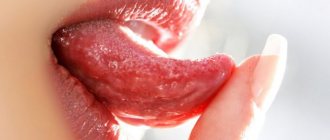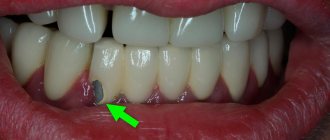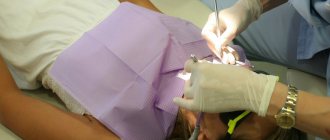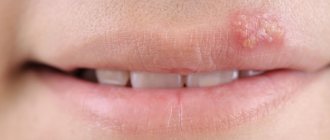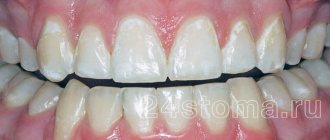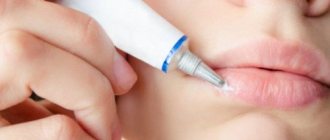Herpes on the lips (herpes labialis) is one of the most common infectious diseases. People call herpes on the lips “cold sores” or “fever”. Cold sores are a very well-known disease. The first description of the symptoms of a “cold on the lips” was made by the Roman physician Herodotus in the 5th century BC. Chronic herpetic infection is an immunodeficiency disease with lifelong persistence of the virus in the cells of the nerve ganglia with dysfunction of both the autonomic and central nervous system, characterized by periodic exacerbations with the appearance of clinical signs (“hypertic vesicles”), localized in places that are constant for each patient - “Locus minoris” . Herpetic blisters affect the mucous membranes of the urethra, vagina, cervix, as well as the mucous membranes of the mouth, eyes, lips, genitals, skin, and when the process generalizes, the liver, brain and other organs. Herpes on the lips, although it is a disease of the body as a whole, usually gives external manifestations on the lips, less often on the nasolabial triangle (on the lips and on the wings of the nose).
Herpes on the lips is characterized by the ability to recur. Some people regard herpes on the lips as an unpleasant inevitability or a cosmetic defect, others, who experience frequent relapses of the disease, as a serious disease that can not only disrupt life plans, but also significantly reduce the quality of life and lead to depression. Most patients who have repeatedly suffered relapses of herpes on the lips wait with fear for the next relapse.
Fact About 20% of the Russian population is susceptible to herpes on the lips
So, after all, the appearance of herpes on the lips: an unpleasant inevitability or a disease worth fighting? Let's figure it out together.
The causative agent of herpes on the lips in 76% of cases is herpes simplex virus type 1 (HSV-1). There are cases of herpes on the lips caused by HSV type 2. HSV-1 and HSV-2 are close relatives and have a number of common biological properties, including the ability to persist for life in the human body. This means that after the initial infection, the virus is not completely removed from the body. Can you get cold sores or herpes labialis? Yes, sure. After all, a “cold on the lips,” being a viral disease, is very contagious. Therefore, sick people and those around them must take the necessary precautions. Patients should not only treat colds on the lips with modern, effective means, but also strictly observe all safety measures during the period of exacerbation, so as not to infect loved ones, children, and colleagues.
What affects the duration of incubation of herpes
Patients often ask questions about what affects the incubation period of herpes in the intimate area or other areas of the human body.
There are a large number of factors that can either lengthen the reproduction period of viral particles or significantly shorten it.
Doctors usually consider:
- age characteristics - everyone knows that infants and older people have weaker immune systems
- environmental conditions - everything that can contribute to a decrease in immunity (staying in a draft, prolonged exposure to the cold, etc.) can lead to a shortening of the period of time from entering the body to the development of a full-fledged disease
- stress also affects the immune system, which can lead to a shorter period of time
Naturally, adherence to proper nutrition, leading a healthy lifestyle, giving up bad habits and a number of other recommendations can increase incubation.
Moreover, in some cases, the virus may never lead to the development of a full-fledged disease, remaining dormant in the body.
How is herpes on the lips transmitted?
Herpes on the lips occurs due to human infection with the herpes simplex virus.
Methods of infection:
- airborne route. In 40% of patients, primary infection with HSV occurs in early childhood, and the source of infection, as a rule, is family members with obvious signs of herpes virus infection.
- contact - household transmission of the virus through contaminated objects: dishes, cutlery, towels, toys, etc.,
- when kissing, in close physical contact with a sick person or a virus carrier,
- during oral, oral-genital, oral-anal contacts,
- after transfusion of blood and its components (hemotransfusion route),
- after organ and tissue transplantation (transplantation route),
- vertical transmission from an infected mother to the fetus during pregnancy, infection of a newborn in the presence of herpetic manifestations in the mother and medical staff, when infected equipment is used to care for newborns.
For a cold on the lips
- Do not touch the area or apply antiviral ointments with your hands where the rash is located. If you do touch them, wash your hands thoroughly with soap and use cotton swabs.
- Do not comb, squeeze, open blisters, or tear off crusts. This can cause the infection to spread to nearby skin or fingers.
- Do not apply medicinal, antiviral agents, or antiseptics to lesions (rash elements) with your hands.
- You should only have your own separate dishes, personal hygiene items, and cosmetics.
- You should refrain from kissing, oral, orogenital contact.
- Even when using barrier contraception during orogenital intercourse, remember that they reduce the risk of infection, but cannot protect 100% from infection.
Classification of herpes on the lips
Depending on the mechanism of infection, acquired and congenital infections are distinguished. Acquired infection is divided into primary and recurrent.
Effect of pregnancy on virus incubation
Often, women who are in the period of bearing a child ask their attending physicians about how the incubation of herpes changes during pregnancy.
It is quite difficult to predict changes in this case.
On the one hand, the body does everything to protect the woman herself, as well as her unborn baby, from negative external influences, including viral particles.
On the other hand, pregnancy is a condition of a woman’s body, accompanied by severe immunosuppression.
Otherwise, bearing a fetus would simply be impossible.
Often it is immunosuppression that prevails in the female body.
As a result, the length of time it takes herpes from entering the body to developing symptoms is significantly shortened. It is also worth considering that herpes is quite capable of penetrating the placenta, leading to infection of the child.
Sometimes it leads to the development of congenital pathologies of varying severity.
How often can herpes on the lips reactivate?
Relapses with type 1 HSV infection occur earlier and more often than with type 2 HSV infection. Lip herpes in 25% of adults has regular relapses 1–2 times a year, and in 5–10% of adults there can be up to six relapses per year. Relapses of the disease can occur with varying frequencies. The appearance of herpetic lesions no more than 4 times a year is regarded as a favorable prognostic sign, especially if the rashes appear in the same place and are moderately expressed. Relapses that occur more often than once every 3 months, monthly or every 2 weeks indicate a significant defect in the immune system, which requires additional examination of the patient. In some patients, a continuous course of the disease is possible, when old elements have not yet resolved, but new ones are already appearing.
The frequency of recurrence of herpes on the lips in men and women is the same.
Persistent herpes on the lips (often recurrent) leads to the development of secondary immunodeficiency, manifested in frequent colds, disruption of general condition, decreased performance, the appearance of low-grade body temperature, lymphadenopathy, and psychoasthenia. Often recurrent herpes on the lips is often the cause of neuropsychiatric disorders.
Recurrent herpes on the lips is accompanied by the risk of:
- Infection of children, sexual partners, others;
- Infection of other areas (eyes, genitals, mucous membranes);
- Long-term persistence of symptoms (up to several months) in persons with reduced immunity;
- The appearance of several lesions;
- Attachment of a secondary bacterial infection.
The influence of HIV infection on the incubation period of herpes
Another common question is how the duration of incubation changes during HIV infection.
There is nothing surprising in such a question.
After all, the human immunodeficiency virus is becoming increasingly common in medical practice today.
Much in this case depends on how strongly the patient’s immunity is suppressed.
For example, if a patient regularly takes HIV medications and his lymphocyte levels remain normal, the incubation period may remain within the standard range.
If the patient ignores the doctor’s recommendations and refuses medications, the level of his defense system drops to catastrophic levels.
The result is predictable: the period of time is greatly shortened.
The disease makes itself felt much earlier than if HIV were controlled or completely absent from the body.
Herpes and pregnancy.
Lip herpes during pregnancy is not dangerous to the fetus and is not an indication for termination of pregnancy. A woman who has experienced an exacerbation of herpes lips during pregnancy produces antibodies that protect the unborn baby.
Only primary infection is dangerous. In this case, the herpes virus can cause termination of pregnancy and the formation of deformities in the fetus.
Genital herpes, if an exacerbation occurs before childbirth, is an indication for cesarean section, since infection of a newborn with herpes is very dangerous for him. In newborns, herpes takes on severe, generalized forms and can even lead to death. Therefore, be attentive to yourself and your unborn child, go through all the studies and procedures that the doctor will prescribe for you. Genital herpes often causes miscarriage or premature birth.
Which doctor will help if herpes infection cannot be avoided?
Which doctor should I contact if I still couldn’t avoid a collision with the disease and there is a suspicion of incubation?
This is a very popular question among patients.
This is not surprising, because different types of herpes can be dealt with by different specialists.
If a person has signs of the genital form of the disease, it is worth visiting a venereologist first.
This doctor will be able to prescribe the necessary tests and give recommendations for therapy.
If you suspect infection with the labial form, you can go to a dermatologist, infectious disease specialist, or just a general practitioner.
Any of these doctors will be able to treat the infection using a variety of medications.
Everything is more complicated with the shingles form of the disease.
In this case, it is necessary to contact infectious disease specialists.
They may even decide that the patient needs to be admitted to hospital.
How does recurrent herpes on the lips manifest?
Recurrent herpes on the lips is recorded in 50-70% of patients who previously suffered from an asymptomatic or clinically pronounced primary form of the disease. Relapse is the repeated appearance of typical rashes in the same place - at the site of primary infection (“Locus minoris”).
Fact The state of immunity determines the likelihood of development and severity of the disease, the frequency of subsequent relapses of herpes on the lips.
Factors contributing to the development of relapse are:
- hypothermia, overheating, hyperinsolation (including in a solarium),
- neuro-emotional stress,
- medical and cosmetic procedures (tattoo), surgical operations,
- somatic, endocrine, oncological, infectious diseases (frequent ARVI),
- hormonal changes
- decreased immunity, primary or acquired (secondary),
- poor nutrition,
- long-term use of medications (hormones, chemotherapy, antibiotics, including antivirals, cytostatics),
- active sexual life (for example, with frequent changes of sexual partners or orogenital contacts).
Herpes on the lips manifests itself symptomatically during relapses. Relapse of the disease occurs against the background of circulating antiviral antibodies and therefore proceeds more easily compared to primary herpes. Subjective sensations and intoxication may be mild or absent altogether.
Fact The clinical picture of recurrent herpes on the lips resembles that of primary herpes.
The duration of relapse is less than the duration of primary herpes on the lips and is 7–10 days.
It should be noted that along with the typical manifestation, herpes on the lips can be asymptomatic, with symptoms that go unnoticed, as well as atypical or abortive.
Atypical forms of herpes on the lips may be caused by a change in the development cycle of herpetic elements in the lesion. In atypical forms of recurrent herpes on the lips, as a rule, one of the stages of development of the process in the lesion (erythema, formation of single or multiple blisters) or one of the components of inflammation (swelling, hemorrhage, necrosis) or subjective symptoms (itching) predominates. For example, the edematous form of herpes on the lips differs from the typical form by a sharp swelling of the subcutaneous tissue and hyperemia of the skin (usually on the lips); vesicles may be completely absent.
The hemorrhagic form of herpes on the lips is characterized by the appearance of blisters not with transparent, but hemorrhagic contents, and the subsequent development of ulcerations.
The abortive form of herpes on the lips occurs in patients who have previously received antiviral treatment and/or vaccine therapy. The lesion in an abortive course goes past some of the stages characteristic of the typical form and may appear as an itchy spot or papule.
The subclinical form of recurrent herpes on the lips is detected during a virological examination of sexual partners with any sexually transmitted disease, or during an examination of married couples. Symptoms in this form are mild or completely absent. Patients with a subclinical form of herpes on the lips are a source of infection for their loved ones, children, and sexual partners.
What tests will help detect infection during the incubation period?
Tests during the incubation period, as doctors note, are particularly difficult.
This is due to the fact that viral infections are already difficult to diagnose.
If we are talking about the incubation period, everything becomes even more difficult.
You should immediately forget about such popular and simple methods as microscopy and smear culture.
Of course, seeding is performed in some laboratories with special conditions, but it is more for research purposes.
The most reliable options are ELISA and PCR.
Moreover, as doctors note, PCR usually provides more information, which in itself is more reliable. This is due to the fact that the technique does not detect traces of a pathogenic microorganism in the blood, but detects it itself.
However, it is worth considering that PCR also has limitations.
If at the time of examination there are not enough viral particles in the body (the threshold value is below the detectable value), then the analysis will be false negative.
Can a cold from hypothermia be contagious?
It would seem that if a person gets sick due to hypothermia, then he does not pose a threat to others, even if he “suffers a cold on his feet.” But this is a wrong point of view. If a person is sick, viruses have already begun to actively multiply in his body. This means that “mild influenza” can lead to serious complications. The disease, as we know, is easier to prevent than to cure, so antiviral drugs are often prescribed in the complex treatment of colds. For example, for prevention you can use VIFERON Gel, applying it to the nasal mucosa three to four times a day, and if a viral infection is diagnosed, then in this case you can use VIFERON suppositories, which is not only an antiviral, but an immunomodulatory drug. It is indicated even for pregnant women from the 14th week of gestation and newborns.
Features of preventing herpes after infection
Patients who think they are in the incubation period will certainly ask the doctor a question.
What to do to ensure that the disease does not develop fully, but remains in a dormant state.
There really aren't many options.
Firstly, the effectiveness of prevention with Valvir and Valtrex has been proven.
These drugs are taken orally in tablet form and can inhibit the activity of viral particles.
The main thing is to take them according to the doctor-recommended regimen.
However, herpes is a virus that cannot be gotten rid of once and for all.
Today such drugs simply do not exist.
Therefore, for example, the PCR reaction may remain positive during diagnostic examinations.
Doctors additionally note that you should not rely only on medications.
Measures must be taken to increase the overall level of immunity.
To do this, they use immunostimulants, lead a healthy lifestyle, follow a light diet, and engage in physical activity.
Herpes on the lips. Diagnostics
If typical symptoms are present, the diagnosis is made based on clinical data; laboratory confirmation is not required.
Laboratory confirmation is required in the following cases:
- when establishing the etiology of the disease in asymptomatic and chronic relapsing course,
- when establishing the etiology of the disease during dissemination of the process,
- when uncharacteristic rashes or atypical localization of rashes appear,
- when establishing the etiology of the infectious process in HIV-infected persons or persons with secondary immunodeficiencies of various origins.
In the above cases, the diagnosis must be established based on a combination of anamnestic, epidemiological, clinical data and laboratory research methods. The specificity of the patient’s rash is confirmed by laboratory methods: either by isolating the virus in cell culture (“gold standard” of diagnosis); or by identifying virus antigens; or by determining viral DNA in discharge from the lesion, in biological materials from the patient using polymerase chain reaction (PCR). To do this, material is taken directly from areas of rashes suspected of herpes. The state of humoral immunity in a patient is assessed by identifying specific antibodies of the IgG and IgM classes to HSV-2/-1 in the blood serum (for this diagnosis it is necessary to donate blood from a vein) using the enzyme-linked immunosorbent assay (ELISA). Detection of IgM and IgG antibodies to HSV determines the duration and severity of the disease and answers the question: is a person infected with HSV?
If you have herpes on your lips, what should you do?
Consult a doctor (infectious disease specialist, dermatologist-venereologist) for advice.
Self-medication is not acceptable!
If your herpes on the lips does not go away, often recurs, and is accompanied by complications, what should you do?
It is recommended to consult a doctor for advice; confirm the specificity of rashes on the lips using laboratory methods, examine the intensity of antiherpetic immunity, the state of the immune status, and sensitivity to antiviral drugs.
Discuss on the forum
What to do if herpes incubation takes a very long time
Doctors have long noticed that not all patients develop herpes according to the standard pattern.
This fact further complicates treatment during the incubation period.
It is worth keeping in mind: if the patient has a strong body, an active immune system, symptoms of the disease may not appear for a very, very long time.
Do you need to worry if there are no symptoms of the disease, although they should be, since infection has definitely occurred?
Until rashes begin to appear, the patient can be calm about his health.
Herpes is not an infection that undermines the body unnoticed.
Its symptoms are quite vivid and difficult to ignore.
If there are no symptoms, then the virus is dormant and does not pose a threat to the body.
Since it is completely impossible to remove a pathogenic microorganism from the body, all that remains is to make efforts to prevent it from becoming more active.
Herpes on the lips, symptoms
Herpes on the lips is clinically manifested by the following symptoms. 1-2 days before the appearance of the rash, the first symptoms of herpes on the lips are subjective sensations in the form of pain, burning, itching, tingling, discomfort in areas of the mucous membranes and skin. There may be symptoms of general intoxication (increased body temperature to 38°C and above , chills, malaise, headache, sleep disturbance). Then small bubbles appear filled with clear liquid against a background of swelling. After 2-4 days, the blisters burst, forming ulcers, then crusts. Unstable pigmentation may remain.
The appearance of blisters in the same place is a distinctive feature of the herpes virus on the lips and all other forms of herpes virus infection “locus minoris”.
How does herpes on the lips manifest in primary and recurrent forms of the disease?
Primary herpes of the lips develops after infection of a previously uninfected person with the virus; in 80-90% of infected people it is asymptomatic, in 10-20% it manifests with clinical symptoms.
The first signs of herpes on the lips may occur after contact with an infected person after a 1-10 day incubation period. Then, on the mucous membranes or on the red border of the lips or adjacent areas of the skin, edematous erythema appears, against which small, grouped (less often merging) blisters filled with clear liquid appear. After 2-4 days, the blisters burst, forming weeping erosions, less often ulcers, healing under a crust or without its formation.
After complete regression of the rash, a slightly pigmented spot remains in its place for some time. Subjective sensations may persist even after the bubbles resolve. In some weakened patients, in young children, along with rashes in the lip area, there may be rashes of other localization, enlarged lymph nodes.
Exacerbation of herpes on the lips occurs against the background of decreased activity of the immune system.
The duration of the acute period for primary herpes on the lips is 10-20 days; in the case of a secondary bacterial infection, it increases to 3-5 weeks.
After this, the disease goes into remission. This means that after the initial infection, the virus remains in the body, accumulating in the sensory ganglia of the cranial ganglia and persisting in them for life. The duration of remission depends on a number of reasons, the main one of which is the state of immunity. Under the influence of provoking factors, the virus can become active at any time and enter the relapse stage.
How does herpes simplex develop?
- It all starts with itching and/or tingling in the place where herpes develops - as we have already found out, most often this is the area of the nasolabial triangle. The skin turns red and begins to itch.
- Next, the stage of inflammation begins. Swelling appears in the affected area and a small, painful pimple appears - a blister containing clear liquid. Over time, this liquid becomes cloudy. A small pimple(s) gradually increases in size.
- The blisters burst 3–5 days after the onset of the disease. A liquid flows from them, containing an uncountable number of viral particles. During this period, contact with a sick person should be stopped, since the risk of infection is very high. At the site of the rash, ulcers with a purulent crust (scabs) form. When the scab is damaged, bleeding begins.
A natural question for every patient is, how many days does it take for herpes to go away? This usually takes about 10 days. If symptoms do not disappear during this time, you should see a doctor, since herpes can signal the presence of other diseases.
Herpes ointment

